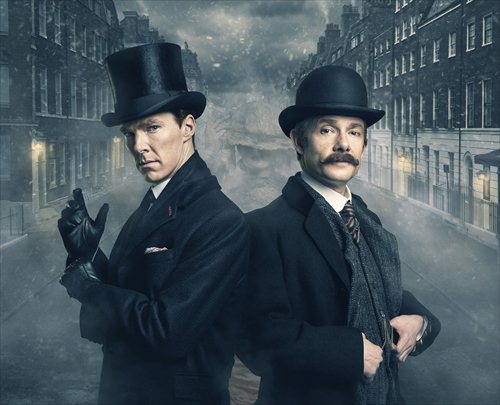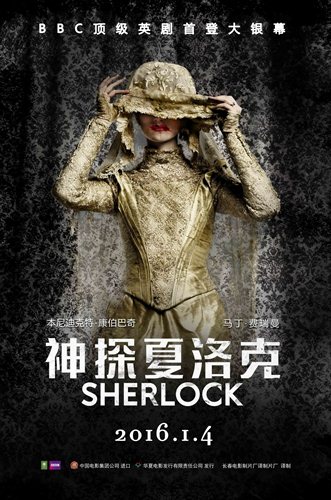Sherlock: The Abominable Bride
New Year feature does TV series and original text justice with an entertaining twist
When you step into the cinema for Sherlock: The Abominable Bride, be aware this was not meant for the big screen.
Rather, it is a New Year special episode filling the gap between the third and fourth season of the BBC TV series, that is being shown in cinemas in China to cash in on the show's huge popularity here.

With that said, you might want to excuse the scriptwriters - Steven Moffat and Mark Gatiss - for making the film seem like an ultra-long prologue of the long-awaited upcoming season.
While the TV series famously pictures Sherlock in modern London, this feature goes back to 1895, the Victorian Era, when the original Sherlock stories by Sir Arthur Conan Doyle were set, by having Holmes (Benedict Cumberbatch) enter his "Mind Palace" with the help of drugs.
On the surface, Holmes is trying to solve a case in which a vengeful bride by the name of Emelia Ricoletti has seemingly risen from the dead to murder men.
However, deep down, Holmes is trying to prove that his arch foe Moriarty (Andrew Scott) has actually died, in a hallucination-within-a-hallucination.
It is at times hard to tell where one layer ends and another begins, as in the movie Inception.
Each thread in itself is simple, sometimes even "elementary," as Holmes carelessly says to Watson (Martin Freeman) by the end, but they make for a confusing tangle when put together.
The best layer takes place near the end, as Holmes wakes to find himself lying on a precipice by a waterfall - the Reichenbach Fall, where in the original tales Holmes fought off Moriarty.
The cinematography and special effects are superb - the moonlit silhouette of Holmes against the shimmering waterfall produces an effect that is at once otherworldly and real.
While The Verge critic Jamieson Cox found the film unpalatable for its "entry-level social commentary," among other drawbacks, I respect the scriptwriters for making use of the period, when women were still confined to the household and denied suffrage, in order to make a feminist statement.
From Holmes' housekeeper Mrs Hudson and Watson's wife Mary to more minor female characters, their dissent for a "men's world" is witty, bitter and sometimes extreme.
This is a refreshingly new perspective in a Sherlock Holmes story.
Highlights of the film include the self-reflexive mind bender of having Victorian-era Holmes read The Strand - the real-life magazine which published Conan Doyle's Sherlock Holmes stories - containing tales of his exploits penned by Watson.
Late Victorian-era signifiers from hansom cabs and steam trains to Holmes' Inverness cape and deerstalker add to the atmosphere.
There are several shots of the silhouette of a contemplating Holmes and Watson sharing a hansom cab ride, all murkily beautiful, that make the illustrations from the original stories come to life.
However, I believe one has to be a Sherlock fan to fully enjoy the lengthy and sometimes meandering conversations that at times feel like fan fiction rather than means of advancing the plot.
Everyone's a critic

A poster for the film Photos: CFP
GT: How do you rate the script?
Zhang Ti, public relations, 27
"As a Sherlock fan, I think it is excellent. It not only relates to the original Sherlock Holmes stories, but also the first three seasons of the show. I love to find those clues and associations here and there."
GT: How do you find Cumberbatch's version of Victorian-era Holmes?
Lily, language teacher, 32
"To be honest I never found his modern-time Holmes attractive at all, but I changed my mind when I saw the Victorian version. He is still a 'high intelligence psychopath,' but at the same time more refined and gentle. The violin scene, for example, is 10 times better than the ones in the TV series."
GT: Would you recommend the film to non-fans of the TV series?
Miss Qin, 22, accountant
"Not really, because I think you have to understand what has happened in the previous seasons - not just the main plots, but the details - to really enjoy how much thought the scriptwriters have put into the work. If not, the case itself, namely the Abominable Bride, would seem a bit out of place and too hastily finished."